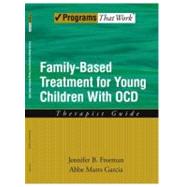Family Based Treatment for Young Children With OCD Therapist Guide
, by Freeman, Jennifer B; Garcia, Abbe Marrs- ISBN: 9780195373639 | 0195373634
- Cover: Paperback
- Copyright: 9/10/2008
Obsessive-compulsive disorder (OCD) can develop at a young age and when it does, it can cause significant distress for the child and the family. Parents may be unclear on the nature of OCD symptoms and how to best respond to their child. Family involvement in the child's symptoms may bemaking the situation worse for the whole family. When treating young children with OCD, it is important to recognize the family component and directly involve parents in treatment. It is also essential to tailor the treatment to a child's age and developmental level. This therapist guide presents a family-based treatment for OCD specifically designed for children ages 5-8. Using a cognitive-behavioral approach, it provides psychoeducation for the family and a set of tools for the management of OCD. "Parent tools" involve differential attention, modeling, andscaffolding techniques. "Child tools" include cognitive strategies such as "bossing back" and using a feelings thermometer to rate anxiety. Treatment centers on exposure with response prevention (E/RP), in which the patient faces feared situations without avoidance or rituals until anxietydecreases. The therapist works with the family to create a hierarchy of E/RP tasks that will be conducted in session and practiced at home. A reward plan helps motivate the child to complete tasks and cooperate with parents. The program ends with relapse prevention to maintain gains and preparefor future symptoms. Therapy process issues are addressed throughout treatment to help families improve life at home. With helpful tips for adapting the program to a child's developmental level and family situation, this guide is a "must-have"for clinicians working with childhood-onset OCD. The corresponding workbook for families reinforces the skills introduced in session and provides forms for homework.Children, their parents, and their families will all benefit from this comprehensive treatment package.






